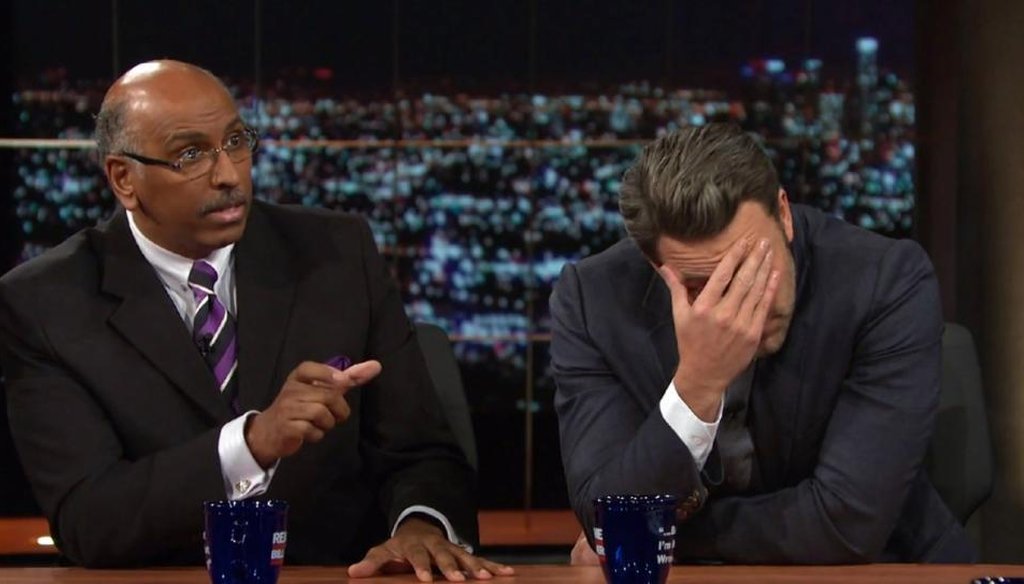Stand up for the facts!
Our only agenda is to publish the truth so you can be an informed participant in democracy.
We need your help.
I would like to contribute

Actor Ben Affleck argued with HBO host Bill Maher in Maher's Oct. 3 episode of "Real Time." (HBO)
The comments about Islam from comedian, social critic, atheist and cable talk show host Bill Maher continue to stir reactions across the TV dial and across the political spectrum.
It started on Maher’s Sept. 26 HBO show. In a monologue, Maher said that when Muslim nations suppress political rights and deny freedoms to women, homosexuals and minorities, they are fair game for harsh criticism.
He singled out liberals for their unwillingness to criticize aspects of Muslim culture.
"We hear a lot about the Republican ‘War on Women.’ It’s not cool Rush Limbaugh called somebody a slut. Okay," Maher said. "But Saudi women can’t vote, or drive, or hold a job, or leave the house without a man. Overwhelming majorities in every Muslim country say a wife is always obliged to obey her husband. That all seems like a bigger issue than evangelical Christian bakeries refusing to make gay wedding cakes."
Maher’s comments have now fueled close to 10 days worth of reactions on cable news networks and on Maher’s HBO show. We’ve fact-checked several claims from the fallout.
Cherry-picking Saudi Arabia
Daily Beast columnist and comedian Dean Obeidallah zeroed in on Maher’s quote that we referenced in our introduction, the part where Maher said women in Saudi Arabia can’t drive.
"You can criticize Muslims," Obeidallah said on MSNBC’s The Ed Show on Oct. 6. "It’s about doing it responsibly. Don't pick and choose and cherry-pick facts to define us by our worst examples. ... Like Saudi Arabia, women can't drive. That’s outrageous."
But, Obeidallah said, "that's the only Muslim country out of 47 Muslim-majority countries that does that."
Obeidallah’s claim that Saudi Arabia stands alone rates True.
We asked Obeidallah and he said not only is it accurate within the Muslim world, but Saudi Arabia might be the only country worldwide that doesn’t let women drive. He pointed to a NPR story that said the oil-rich nation holds that dubious distinction, although it clarified "while there is no law formally banning female drivers, the government does not give them licenses."
Some Saudi women have gotten behind the wheel and driven in plain sight to challenge the country’s policy.
We went through a list of Muslim-majority nations and from everything we found, Obeidallah is correct about Saudi Arabia’s unique status. Another country that blocked women from driving did not show up. (For the record, our list had 51 nations, not 47. And there's another list that has 49. But we won't quibble over that.)
John Esposito is a leading expert on Islam and a professor of International Affairs and Islamic Studies at Georgetown University. We asked him if Saudi Arabia was the sole Muslim nation with this policy regarding women.
"Yes," Esposito said.
FGM and Muslim countries
Another critic of Maher, Reza Aslan, an author and University of California-Riverside professor of religious studies, accused Maher of another misrepresentation.
Aslan criticized Maher for making "facile arguments" when he generalized about Muslims and mislabeled female genital mutilation an Islamic problem.
"It's a central African problem," Aslan said. "Eritrea has almost 90 percent female genital mutilation. It's a Christian country. Ethiopia has 75 percent female genital mutilation. It's a Christian country."
We found that Aslan is right that female gender mutilation is a problem that also occurs outside of Muslim countries.
So Aslan’s claim rates Mostly True.
Female genital mutilation refers to procedures that remove, in part or in whole, external genitalia for a non-medical reason. International groups such as the World Health Organization, UNICEF and Human Rights Watch condemn the practice as a flagrant example of gender inequality -- one that carries risks of prolonged bleeding, infection, infertility and complications during birth. When performed, the procedure is usually done on young girls.
Seven of the top eight countries with very high rates of female circumcision are majority Muslim, including the "almost universal" levels in Somalia, Egypt, Guinea and Djibouti, according to UNICEF. But Eritrea, as Aslan said, is No. 5 among countries with high prevalence at 89 percent, and it is home to more Christians than Muslims.
Ethiopia, which is 63 percent Christian and 34 percent Muslim, has a moderately high rate of 74 percent, making it No. 11 on the list.
So the countries in which female genital cutting is a practice are mostly Muslim, but they are not exclusively Muslim. Of the 29 countries tracked by UNICEF, 14 are home to more Christians than Muslims.
O’Reilly’s defense
Fox News host Bill O’Reilly came to Maher’s defense during an Oct. 6 segment of The O’Reilly Factor.
Among O’Reilly’s points -- the governments of Muslim-majority nations have "failed to confront Islamic terrorism (and) have not attacked violence in the name of Allah."
O’Reilly then played video that featured Palestinian youngsters jumping and smiling as news spread of the terrorist attacks on Sept. 11, 2001.
"Thousands of Muslims, regular folks, celebrated in the streets," O’Reilly said. "They were happy that more than 3,000 innocent people, including Muslims, were murdered. Again, these people are a minority but they were not called out in any official way by Muslim nations around the world."
O’Reilly is correct that public demonstrations in support of the 9/11 attacks took place. They largely occurred in the Palestinian territories, although we also found reports of one in Egypt. Middle East specialist Peter Mandaville, associate professor of government and politics at George Mason University, recalls them as "small scale and localized."
But our fact-check is focused on the question of whether Muslim nations repudiated the celebrations.
We found a couple of compilations of Muslim reaction in the immediate aftermath of the attacks. In addition to Mandaville, we contacted several researchers who study the Middle East. We found no instance when the government of a Muslim-majority nation chastised or condemned the people who were elated by the toppling of the World Trade towers and the other deadly events of that day.
What we did find were many official condemnations of the attacks themselves.
King Abdullah II of Jordan said, "What these people stand for is completely against all the principles that Arab Muslims believe in."
The day after the attacks, Abdelouahed Belkeziz, Secretary-General of the Organization of the Islamic Conference, issued a statement saying he was "denouncing and condemning those criminal and brutal acts that ran counter to all covenants, humanitarian values and divine religions foremost among which was Islam."
The Organization of the Islamic Conference (now called the Organization of Islamic Cooperation) represents all of the Muslim nations in the Middle East and worldwide. The group later issued a joint statement that spoke to "the necessity of tracking down the perpetrators of these acts in the light of the results of investigations and bringing them to justice to inflict on them the penalty they deserve."
The League of Arab States said much the same thing, as did Islamic religious leaders in Saudi Arabia, Egypt, Iran and other countries.
O’Reilly’s statement is accurate as far as it goes, but it leaves out important information that might lead someone to reach a different conclusion. So we said Half True.
Affleck on ISIS, minor league baseball
Maher invited actor and liberal activist Ben Affleck on his follow-up program Oct. 3, where the two debated Maher’s earlier comments.
Maher argued that the beliefs and actions of Islamic State, while widely decried as extreme, are not all that different from the core tenets of Islam practiced by Muslims around the world. Affleck called that an unfair generalization of Muslims, which number about 1.6 billion people and represent the world’s second-largest religion.
Affleck then offered a comparison to speak to the size of the Islamic State versus the number of Muslims worldwide.
"ISIS couldn't fill a Double A ballpark in Charleston, W. Va.," Affleck said.
It’s clear Affleck’s comment was at least partially intended to draw laughs, but he used it to strengthen his argument that the number of Islamic State fighters pales in comparison to the Muslim population overall.
That’s worth a second look. Because it’s False.
The U.S. government has had a hard time pinning down the precise number of jihadist fighters within the Islamic State, which is also known as ISIS and ISIL.
Part of the problem is the group has grown quickly as it has captured more ground in Syria and Iraq.
Over the summer, it was widely reported that the U.S. government estimated about 10,000 fighters in the al-Qaida-linked group.
In September, the CIA more than doubled the group’s estimated size to between 20,000 and 31,500 fighters. In a statement to PunditFact, the CIA public affairs office explained the figure is based on intelligence reports collected from May to August. The CIA attributes the growth to "stronger recruitment since June following battlefield successes and the declaration of a caliphate, greater battlefield activity, and additional intelligence."
At least 2,000 of the fighters reportedly have Western passports, too.
Non-U.S. reports say the Islamic State is potentially much larger. RT, the Russian government-sponsored English news organization, quoted an Iraqi intelligence adviser as saying the Islamic State numbered 100,000 in August. Al Jazeera reported that the Islamic State had an army of 50,000 troops in August. A Kurdish security official told 60 Minutes in September there were 40,000 Islamic State fighters.
Even the smallest estimate, 20,000, is too big for the West Virginia’s ballpark.
Charleston is home to the West Virginia Power, a Class A affiliate of the Pittsburgh Pirates since 2009.
The Power plays at Appalachian Power Park, which has a maximum seating capacity of 4,500 for baseball games, said Adam Marco, the team’s radio broadcaster and marketing director. The park could hold up to 11,000 people for charity events and concerts that would allow people onto the field, he said.
So even the lowest estimate of Islamic State fighters would be way too much for the stadium.
The story for Double A teams, which is what Affleck said even though the West Virginia is Class A, is no different.
The largest Double A team stadium belongs to the Jacksonville Suns, which can hold 11,000 fans, said Minor League Baseball spokeswoman Mary Marandi.
Our Sources
See individual fact-checks.























































